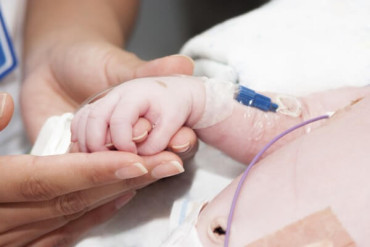Is It Normal For My Baby To Stop Breathing During Birth?

Every parent will tell you that there is nothing more amazing than the birth of a child. After waiting nine months in anticipation of a baby’s arrival, expectant parents are overjoyed when mom goes into labor and the big day is upon them. It’s normal for parents-to-be to have expectations that everything will go smoothly and that mom and baby will both be fine after delivery. That isn’t always the case though. There can be complications for both mother and child, and some can be devastating. When a baby is delivered, it seems that everyone present waits with bated breath until they hear that first cry coming from the tiny new person. But what happens when it doesn’t come because the baby isn’t breathing?
Why Isn’t My Newborn Breathing?
There are a number of things that can cause a newborn baby to stop breathing during birth. If the umbilical cord becomes pinched or kinked during delivery, it may prevent the baby from being able to breathe. Also, a prolapsed umbilical cord, a complication where the umbilical cord drops through the cervix before the baby causing the cord to be crushed by the baby as it moves through the birth canal, can cause the baby to stop breathing. Often times, these complications during delivery can be managed by doctors performing an emergency caesarian section, and they have favorable neonatal outcomes, with both mom and baby suffering no long-lasting medical issues.
When these complications are not managed quickly and appropriately though, the baby may be in danger of suffering from hypoxia or anoxia, which can lead to long term medical complications, or even death. Hypoxia occurs when there is a lack of oxygen to the brain. Anoxia is the much more severe, complete depletion of oxygen to the brain. A lack or absence of oxygen can cause neurological issues, brain damage or cerebral palsy for the child, all of which can be life-long medical issues creating emotional and financial burdens for parents.
Who Is At Fault For My Child’s Long Term Medical Conditions?
Obviously, some complications that occur during the delivery of a baby are unavoidable and are in no way the fault of medical professionals. There is the possibility though, that your baby, or the baby of a loved one, stopped breathing during delivery due to something that could have been prevented or managed more quickly. When the doctor delays in performing a C-section to deliver a baby in distress, or fails to recognize or treat hypoxia, it could be considered negligence.
Is There Anything I Can Do Now?
If you, or someone you know, have given birth to a baby who stopped breathing or died during delivery, you may have been a victim of medical negligence. It is important to have medical records reviewed by medical and legal professionals to determine if the injury was avoidable. At Ross Feller Casey, we have a team of attorneys who are experts in both the medical and legal aspects of negligence. We have medical doctors, who are also attorneys, on staff to review your records and conclude whether or not you have a case.
Our firm will evaluate your case for free, and we work on a contingency basis, so there is no charge to you unless there is a financial recovery made. Please contact us to speak to one of our attorneys for a consultation, as you may be entitled to compensation for your case.
Disclaimer: Ross Feller Casey, LLP provides legal advice only after an attorney-client relationship is formed. Our website is an introduction to the firm and does not create a relationship between our attorneys and clients. An attorney-client relationship is formed only after a written agreement is signed by the client and the firm. Because every case is unique, the description of awards and summary of cases successfully handled are not intended to imply or guarantee that same success in other cases. Ross Feller Casey, LLP represents catastrophically injured persons and their families in injury and wrongful death cases, providing legal representation in Pennsylvania and New Jersey.





